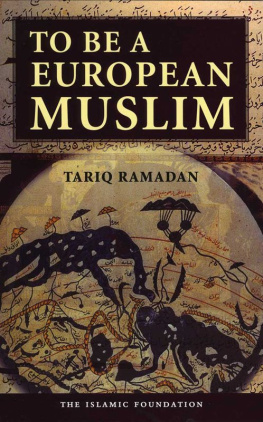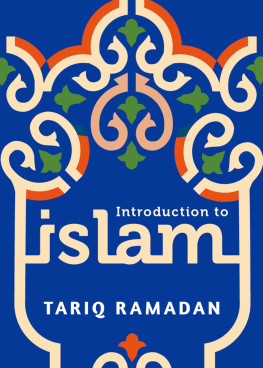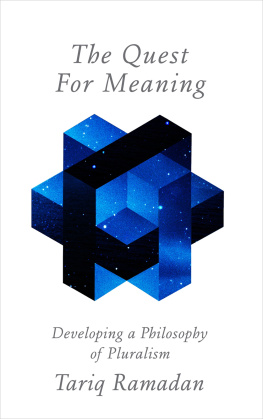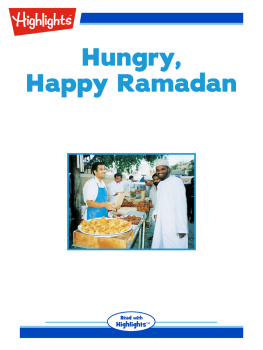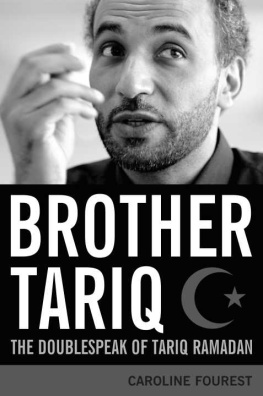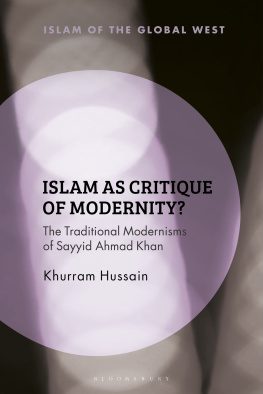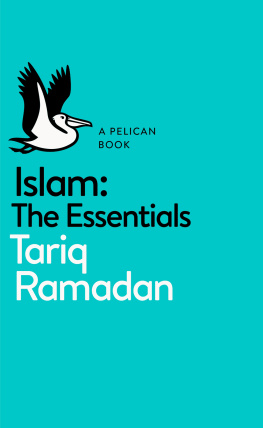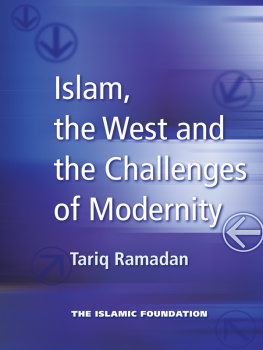Islam,
the West and
the Challenges
of Modernity
Tariq Ramadan
Translated by
Sad Amghar
THE ISLAMIC FOUNDATION
The Islamic Foundation, 2001/1421 H.
Reprinted 2004/1424 H., 20081429 H. and 2009/1430 H.
All rights reserved.
No part of this publication may be reproduced, stored in a
retrieval system, or transmitted in any form or by any means,
electronic, mechanical, photocopying, recording or otherwise,
without the prior permission of the copyright owner.
Published by
THE ISLAMIC FOUNDATION
Markfield Conference Centre, Ratby Lane,
Markfield, Leicester LE67 9SY, UK
E-mail:
Website: www.islamic-foundation.com
Quran House, PO Box 30611, Nairobi, Kenya
PMB 3193, Kano, Nigeria
Distributed by: Kube Publishing Ltd.
Tel.: 0044(01530)249230, fax: 0044(01530)249656
E-mail: info@kubepublishing.com
British library Cataloguing-in-publication data
a catalogue record for this book is available from the British Library
ISBN 978-0-860373-11-7
typeset by: N.A. Qaddoura
cover design: Imtiaze Ahmad Manjra
An Entire Life
And that this is My path, straight; so do you follow it, and follow not diverse paths lest they scatter you from His path. (Qurn, 6:153)
I still have the intimate memory of his presence and of his silences. Sometimes, long silences sunk in memory and thoughts and, often, in bitterness. He had a keen eye and a penetrating, profound look that now carried his warmth, kindness and tears, and now armed his determination, commitment and anger. How many times was it difficult forme to cross the expression of his big open, powerful, suggestive and interpolator eyes which accompanied his words up to my heart, that they awakened, troubled and shook. All those who have met him were struck by this trouble, this inward trembling. He had learned the essential and called for the same without re-routing. This, always, with a heart and with such intelligence. He was so afraid of causing harm, wounding or hurting someones ear. His kindness was behind his hesitations and, sometimes, clumsiness.
Very early, I learned at his side how much the world is nourished by lies, rumours and scandal-mongering. When men lose morality they find the jungle and become wolves. Of this kind there were many around him; those who fought and sullied him for political profit, those who forgot him for professional profit and those who betrayed him for financial profit. So much was said, written and lied about: that he has met him who he never saw, that he spoke to him but he never listened and that he was involved in secret plots which he never dreamt of. In my memory resounds the words of one of his brothers of the road: He could have been a millionaire, not by flattering kings, but by simply accepting to be quiet and keep silent about what goes on. He refused; he said the truth and re-said it, before God, without fear of losing everything.
I also remember the following story, repeated a thousand times by my elder brother Aymen, a story that made him shed so many tears. He was then 15 years old when he heard it during a travel that found him in the presence of wealthy princes: The money that you want to give me is put on the palm of my hand; as to myself, by Gods command, I do not work except for that which is posited in and penetrates hearts Despite his material difficulties, he rejected exorbitant amounts of money in the name of his faith in God, of his exactness of truth and of his love for justice. Aymen has never forgotten the lesson; it has fashioned him and he transmitted it.
He learnt everything from a man who gave him so much, offered him so much and who, from a very early age, trained and protected him. On his subject he was inexhaustible. Hasan al-Banna, through his total devotion to God and His teachings, put light in his heart and showed him the way of his commitment. To those who criticised him, spoke without having even met or heard him, or those who had simply read him, he reminded them how much he had learnt at his side of spirituality, love, fraternity and humility. For hours on end, he brought out of his memory the events and instances that had marked him when he was just like his son; and when he was respectfully called, in the whole of Egypt, the little Hasan al-Banna. The profound faith of his master, his devotion, intelligence, his knowledge and open-mindedness, his goodness and kindness were all qualities that emanated in a permanent fashion from his description.
Often, he spoke of the determination in his commitment, at all moments, against colonialism and injustice and for the sake of Islam. This determination was though never a sanction for violence, for he rejected violence just as he rejected the idea of an Islamic revolution. The only exception was Palestine. On this, the message of al-Banna was clear. Armed resistance was incumbent so that the plans of the terrorists of Irgun and of all Zionist colonisers would be faced up to. He had learnt from Hasan al-Banna, as he said it one day: to put ones forehead on the ground. The real meaning of prayer being giving strength, in humility, to the meaning of an entire life. He also learnt love in God, patience, the importance of work in-depth, education and solidarity. Finally, he learnt to give everything. After the assassination of his master, in 1949, he retained the lesson and sacrificed all in order to make everyone hear the liberating message of Islam. History is written by the powerful; the worst calumnies were said about Imm Hasan al-Banna. He never ceased to write about and say the truths from which he was nourished. But the despots love of power caused death and spread much blood as well as so much torture.
Already, when he was barely 20 years old, al-Banna had entrusted him with the editorship of his magazine al-Shihb. Then he volunteered to fight in Palestine, at the age of 21, participating in the defence of Jerusalem. In 1948, aged 22, he went to Pakistan where he was approached about taking the post of General Secretary of the World Islamic Congress. His determination scared the diplomats. He remained in Pakistan for several months. He took part in the debates about constitutional questions and directed a weekly radio programme on Islam and the Muslim world which made him very popular among the youth and intellectuals. Returning to Egypt, he engaged himself in mobilisation for social and political reform. Then he travelled across the country, gave lectures, and directed encounters. In 1952, he launched, on the model of al-Shihb, a monthly magazine called al-Muslimn in which were to write some of the greatest Muslim scholars and, which was going to be distributed from Morocco to Indonesia in both Arabic and English. But Hasan al-Banna, well before his assassination, warned them: the road will be long, marked out with pain, sadness and adversity. He knew, himself and all those who accompanied him, that they would be subjected to lies, humiliation, torture, exile and death.
For him it was exile, because Nasser deceived them. He had to leave the country in 1954, never to return, except on 8th August 1995 in his coffin 41 years of exile, suffering, commitment and sacrifice for God and justice and against all dictators and hypocrisies. Exile is the exactness of faith. The length of this road, the difficulties and the sorrows were numerous and continuous. This was first experienced in Palestine were he was designated General Secretary of the World Islamic Congress of Jerusalem before being banned from the city by Glubb Pasha, himself subjected to American orders. Then, in Damascus were he restarted the diffusion of al-Muslimn with Mustafa al-Sibai. Thereafter in Lebanon, before arriving in Geneva in 1958. He obtained his Doctorate in Cologne in 1959, and published his thesis under the title Islamic Law: its Scope and Equity in which he presented the synthesis of the fundamental positions of Hasan al-Banna on the subject of the


